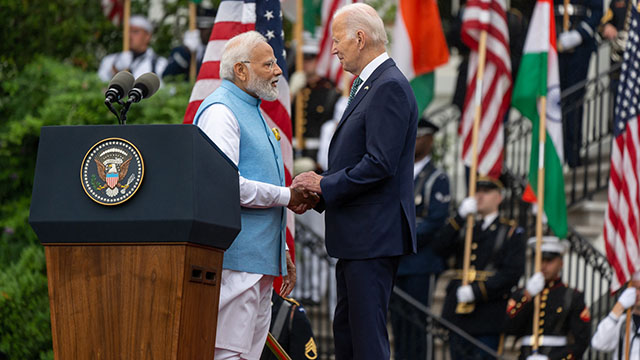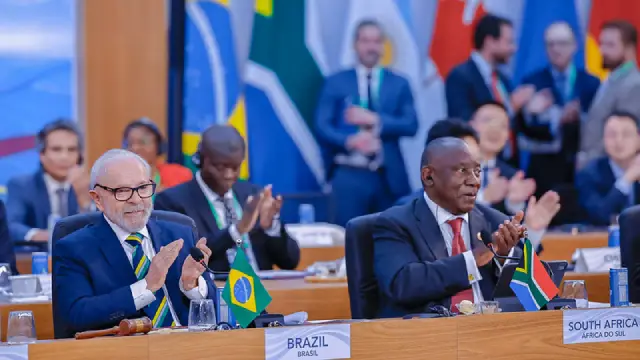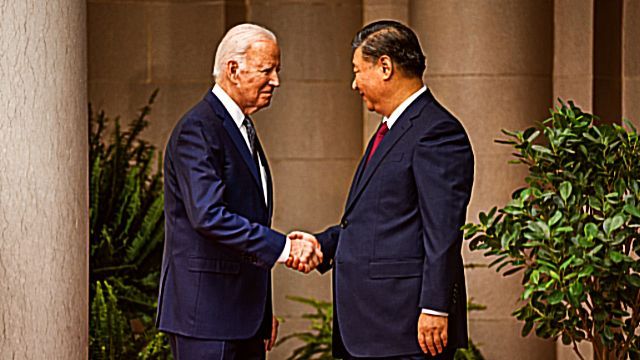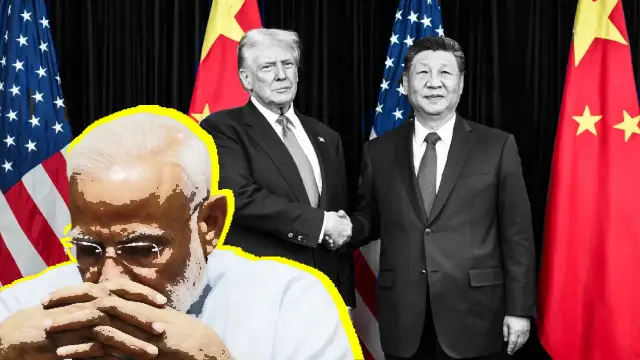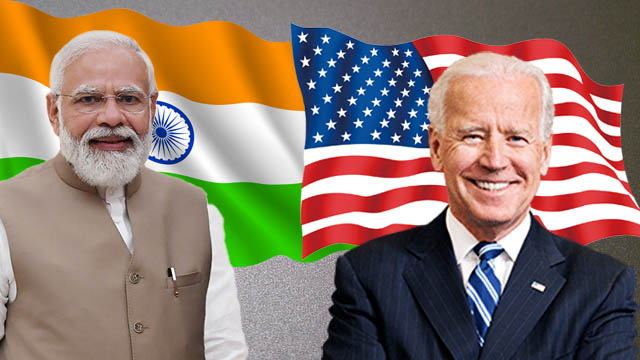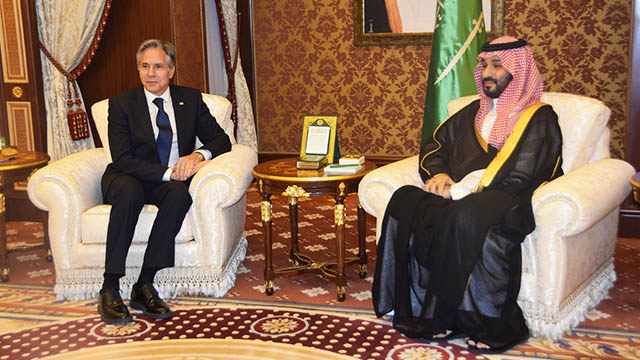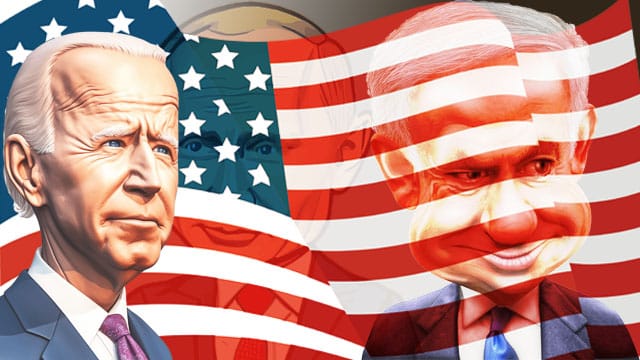Indian Prime Minister Narendra Modi’s state visit to the US wasn’t a smooth sail, despite bagging a lot of deals from Washington DC. Modi came under harsh criticism from several quarters in the US and also had to face what he didn’t in India – a live press conference. Modi’s US visit also exhibited the US’s hypocritic stand on human rights and democracy abroad.
Modi received the rare opportunity to address the joint session of the US Congress second time during his tenure. So far, a handful of statesmen have received this honour to address Congress twice in their lifetime.
However, the decision to invite Modi to address the US Congress irked several liberal Democrats who boycotted the event.
Democrat representatives boycotted the joint address
Democrat representatives Rashida Tlaib of Michigan, Cori Bush of Missouri, Ilhan Omar of Minnesota, and Jamaal Bowman of New York issued a joint statement criticising the US government’s decision to allow Modi a chance to address the Congress.
“We must never sacrifice human rights at the altar of political expediency”, these four Democrats said in a statement. Calling on other Democrats to “stand in solidarity with the communities that have been harmed by Modi and his policies”, the Congresswomen called for a boycott of his address.
Democrat representative from New York Alexandria Ocasio Cortez criticised the Biden administration for allowing someone like Modi, who is accused of gross human rights violations in India, especially of persecuting India’s minority Muslims, to address the Congress, that too for the second time in a row.
“A joint address is among the most prestigious invitations and honors the United States Congress can extend (sic)”, Cortez said in a statement published on her Twitter handle. “We should not do so for individuals with deeply troubling human rights records — particularly for individuals whom our own State Department has concluded engaged in systematic human rights abuses of religious minorities and caste-oppressed communities (sic)”, Cortez added.
Former president’s jibe
Apart from the boycott of his joint address, Modi also faced criticism from someone he once identified as one of his closest friends. Former president Barack Obama subtly criticised Modi’s rule for its alleged human rights violations.
Obama told CNN anchor Christiane Amanpour, “If the President (Joe Biden) meets with Prime Minister Modi, then the protection of the Muslim minority in a majority Hindu India, that’s something worth mentioning… If I had a conversation with Prime Minister Modi —whom I know well— part of my argument would be that if you do not protect the rights of ethnic minorities in India, then there is a strong possibility India at some point starts pulling apart and we have seen what happens when you start getting those kinds of large internal conflicts. That would be contrary to the interests not just of Muslim India but also Hindu India. I think it’s important to be able to talk about these things honestly (sic).”
Obama, however, also defended Biden’s invitation to Modi citing the geopolitical compulsions of Washington DC and said that even during his reign he had to deal with leaders whom he won’t consider “democratic”.
“Look, it’s complicated. The president of the United States has a lot of equities. And when I was president, I would deal with figures in some cases who were allies, who, you know, if you pressed me in private, do they run their governments and their political parties in ways that I would say are ideally democratic? I’d have to say no”, Obama told CNN.
“You had to do business with them because they’re important for national security reasons. There are, you know, a range of economic interests”, Obama added.
The Obama irony
The US had imposed a travel ban on Modi for his controversial role in the 2002 Gujarat pogrom in which hundreds of Muslims were reportedly killed by Hindutva-incensed mobs allegedly linked with Rashtriya Swayamsevak Sangh’s (RSS) frontal organisations.
Modi is a lifetime member of the RSS, alike several top leaders of his federally ruling far-right Hindu nationalist Bharatiya Janata Party (BJP). The RSS is accused of being a fountainhead of ultra-right Hindu nationalist movement that has a global presence.
The RSS reportedly has a strong influence on US policymakers and a strong organisational presence in the US under the banner of Hindu Swayamsevak Sangh (HSS), its international outfit.
Ironically, it was under Obama that the travel ban on Modi was lifted after he became prime minister in 2014. Modi hugged Obama on his visit to India as the chief guest during Republic Day of 2015. Modi also travelled to the US during Obama’s tenure and addressed the joint session of the Congress for the first time.
In a scripted interview given to film actor Akshay Kumar in 2019, which is mocked by the Opposition as a “mango interview”, Modi said he shares a close relationship with Obama and the latter had been worried about the Indian prime minister’s long working hours.
An angry CM courts controversy
Obama’s comments on Modi irked the ruling BJP and the RSS cadre in India and the HSS units in the US. In a virulent tweet, Assam Chief Minister Himanta Biswa Sarma threatened to persecute Indian Muslims by using Obama’s Muslim middle name as a hint.
Reacting to a tweet by journalist Rohini Singh, who asked how would the Assam Police act on a first information report (FIR) filed against Obama in the state, Sarma said, “There are many Hussain Obama in India itself. We should prioritize taking care of them before considering going to Washington. The Assam police will act according to our own priorities (sic).”
Sarma’s tweet, ironically, came at a time when Modi, who took his first unscripted question at a press conference in the US after becoming the prime minister in 2014, told the press that there are no discriminations against the Muslims in India and “democracy” is in the “DNA” of India, alike the US.
US hypocrisy on human rights
The US’s hypocrisy on human rights was once again exposed during Modi’s visit. While the US loves to lecture the whole world on “democracy” and “human rights”, concealing the gross violations in its own backyard, during Modi’s visit to Washington DC agreed that it’s not in a position to lecture others on human rights.
Geopolitical compulsions, especially of having India on board its anti-China bandwagon as a junior partner, made the Biden administration even give up its trademark human rights lecture to Modi, whose government has been accused by Washington DC of violating civil rights, persecuting minorities, imprisoning journalists and curtailing press freedom.
Jake Sullivan, the US president’s national security adviser, didn’t munch his words and clearly stated that Washington DC won’t lecture him, or for that matter others, on issues where it itself has problems.
One of the so-called icons of “freedom of the press” and global advocate of “human rights”, The New York Times carried a full-page ad on the arrival of Modi, to welcome him to the US.
Other major mainstream media houses, which are vociferous in labelling chosen adjectives against whoever they consider “autocratic” in the Global South, according to their western standards, also maintained a meek tonality on Modi’s state visit to the US and the joint address to the Congress.
It’s evident from this chain of events that the US’s stand on human rights and democracy is relative to its geopolitical and economic interests. However, it doesn’t stop Washington DC from its biased moral policing over the world, especially when it comes to the Global South.
Moreover, it’s also evident that despite the hullaballoo over Modi’s state visit to the US, he can’t escape the controversies that surround his government and the Hindu nationalist agenda that his ruling BJP pursues.
Although one may call the meetings in Washington successful for India, especially Modi’s home state Gujarat, if seen holistically this visit has further mortgaged India’s interests and sovereignty to the US and its western allies.
Join our channels on Telegram and WhatsApp to receive geopolitical updates, videos and more.

